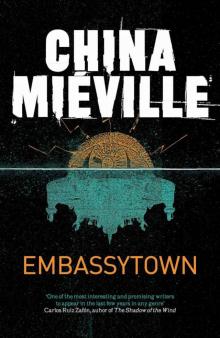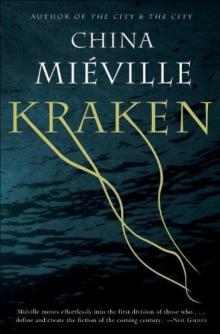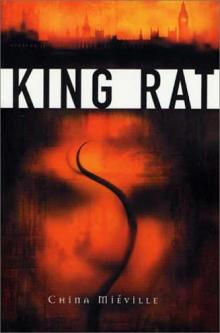- Home
- China Miéville
The Scar Page 3
The Scar Read online
Page 3
Bellis knew that a ship this size with an ironclad hull and New Crobuzon’s colors flying would almost certainly not be preyed upon. The crew’s vigilance was only slightly unnerving.
The Terpsichoria was a merchant vessel. It was not built for passengers. There was no library, no drawing room, no games room. The passengers’ mess was a halfhearted effort, its walls bare but for a few cheap lithographs.
Bellis took her meals there sitting alone, monosyllabic to any pleasantries, while the other passengers sat below the dirty windows and played cards. Bellis watched them surreptitiously and intensely.
Back in her cabin, Bellis took endless stock of what she possessed.
She had left the city in a sudden hurry. She had very few clothes, in the austere style she favored: severe and black and charcoal. She had seven books: two volumes of linguistic theory; a primer in Salkrikaltor Cray; an anthology of short fiction in various languages; a thick, empty notebook; and copies of her own two monographs, High Kettai Grammatology and Codexes of the Wormseye Scrub. She had a few pieces of jewelry in jet and garnet and platinum; a small bag of cosmetics; ink and pens.
She spent hours adding details to her letter. She described the ugliness of the open seas, the harsh rocks that poked up like traps. She wrote long, parodic descriptions of the officers and passengers, reveling in caricature. Sister Meriope; Bartol Gimgewry the merchant; the cadaverous surgeon Dr. Mollificatt; Widow and Miss Cardomium, a quiet mother and daughter transformed by Bellis’ pen into a scheming pair of husband hunters. Johannes Tearfly became the professorial buffoon pilloried in music halls. She invented motivations for them all, speculating on what might send them halfway across the world.
Standing at the back of the ship on the second day, by the morass of gulls and ospreys still bickering over the ship’s effluent, Bellis looked for islets but saw only waves.
She felt jilted. Then, as she searched the horizon, she heard a noise.
A little way from her the naturalist, Dr. Tearfly, stood watching the birds. Bellis’ face set hard. She prepared to leave as soon as he spoke to her.
When he looked down and saw her watching him coldly, he gave her an absent smile and pulled out a notebook. His attention was off her immediately. She watched as he began to sketch the gulls, paying her no mind at all.
He was in his late fifties, she guessed. His thinning hair was combed tightly back, and he wore little rectangular spectacles and a tweed waistcoat. But despite the academic uniform he did not look weak or absurdly bookish. He was tall, and he held himself well.
With quick, precise strokes, he marked out folded avian claws and the brute pugnacity of the seagulls’ eyes. Bellis warmed to him very slightly.
After a while she spoke.
It made journeying easier; she admitted that to herself. Johannes Tearfly was charming. Bellis suspected he would be equally friendly to everyone on board.
They took lunch together, and she found it easy to steer him away from the other passengers, who watched them intently. Tearfly was endearingly free of intrigue. If it occurred to him that keeping the company of the rude and distant Bellis Coldwine might lead to rumors, he did not care.
Tearfly was happy to discuss his work. He enthused about the unstudied fauna of Nova Esperium. He told Bellis about his plans for publishing a monograph, on his eventual return to New Crobuzon. He was collating drawings, he told her, and heliotypes and observations.
Bellis described to him a dark, mountainous island she had seen in the north, in the small hours of the previous night.
“That was North Morin,” he said. “Cancir’s probably off to the northwest right now. We’ll be docking at Dancing Bird Island after dark.”
The ship’s position and progress were matters of constant conversation among the other passengers, and Tearfly looked at Bellis curiously, bewildered by her ignorance. She did not care. What was important to her was where she was fleeing from, not where she was, or where she was going.
Dancing Bird Island appeared just as the sun went down. Its volcanic rock was brick-red, and hunched into little peaks like shoulder bones. Qé Banssa clambered up the slopes of the bay. It was poor, an ugly little fishing port. The thought of setting foot in another resentful town imprisoned by maritime economics depressed Bellis.
The sailors without shore leave were sullen as their comrades and passengers disappeared down the gangplank. There were no other New Crobuzon ships at dock: nowhere for Bellis to deliver her letter. She wondered why they were stopping at this negligible port.
Apart from an arduous research trip to the Wormseye Scrub years previously, this was the furthest Bellis had ever been from New Crobuzon. She watched the small crowd at the dockside. They looked old and eager. Over the wind she heard a smattering of dialects. Most of the shouts were in Salt, the sailors’ argot, a found language riveted together from the thousand vernaculars of the Basilisk Channel, Ragamoll, and Perrickish, the tongues of the Pirate and Jheshull Islands.
Bellis saw Captain Myzovic climb the steep streets toward New Crobuzon’s crenellated embassy.
“Why are you staying on board?” said Johannes.
“I don’t feel any great need for greasy food or trinkets,” she said. “These islands depress me.”
Johannes smiled slowly, as if her attitude delighted him. He shrugged and looked up at the sky. “It’s going to rain,” he said, as if she had returned his question, “and I have work to do aboard.”
“Why are we stopping here anyway?” said Bellis.
“I suspect it’s government business,” said Johannes carefully. “This is the last serious outpost. Beyond this the New Crobuzon sphere of influence becomes far more . . . attenuated. There are probably all manner of things to be attended to, out here.
“Luckily,” he said after a silence, “it’s none of our business.”
They watched the still-darkening ocean.
“Have you seen any of the prisoners?” Johannes asked suddenly.
Bellis looked at him in surprise. “No. Have you?” She felt defensive. The fact of the ship’s sentient cargo discomfited her.
When it had come, Bellis’ realization that she had to leave New Crobuzon had been urgent and frightening. She had made her plans in low panic. She needed to get as far away as she could, and quickly. Cobsea and Myrshock seemed too close, and she had thought feverishly of Shankell and Yoraketche, and Neovadan and Tesh. But they were all too far or too dangerous, or too alien, or too hard to reach or too frightening. There was nothing in any of them that could become her home. And Bellis had realized aghast that it was too hard for her to let go, that she was clinging to New Crobuzon, to what defined her.
And then Bellis had thought of Nova Esperium. Eager for new citizens. Asking no questions. Halfway across the world, a little blister of civilization in unknown lands. A home from home, New Crobuzon’s colony. Rougher, surely, and harder and less cosseted—Nova Esperium was too young for many kindnesses—but a culture modeled on her city’s own.
She realized that, with that destination, New Crobuzon would pay her passage, even as she fled it. And a channel of communication would remain open to her: regular if occasional contact with ships from home. She might then know when it was safe to return.
But the vessels that undertook the long, dangerous journey from Iron Bay across the Swollen Ocean carried with them Nova Esperium’s workforce. Which meant a hold full of prisoners: peons, indentured laborers, and Remade.
It curdled the food in Bellis’ stomach to think of the men and women locked below, out of the light, and so she did not think of them. She would have had nothing to do with such a voyage and such harsh traffic if she had had a choice.
Bellis looked up at Johannes, trying to gauge his thoughts.
“I must admit,” he said hesitantly, “I’m surprised I’ve heard no sound at all from them. I had thought they would be let out more often than this.”
Bellis said nothing. She waited for Johannes to change the subject, so t
hat she could continue to try to forget what lay beneath them.
She could hear the bonhomie from Qé Banssa’s waterfront pubs. It sounded urgent.
Under tar and steel, in the damp chambers below. Food bolted and fought over. Shit, spunk, and blood congealing. Shrieks and fistfights. And chains like stone and all around whispers.
“That’s a shame, lad.” The voice was rough from lack of sleep, but the sympathy was genuine. “You’ll most probably get a hiding for that.”
Before the bars of the prison hold, the cabin boy stood looking mournfully at shards of pottery and spilt stew. He had been spooning food into bowls for the prisoners, and his hand had slipped.
“Clay like that looks strong as iron, till you drop it.” The man behind the bars was as filthy and tired as all the other prisoners. Bubbling from his chest, visible beneath a torn shirt, was a huge tumor of flesh from which emerged two long ill-smelling tentacles. They swung lifeless, deadweight blubbery encumbrances. Like most of the transportees, the man was Remade, carved by science and thaumaturgy into a new shape, in punishment for some crime.
“Reminds me of when Crawfoot went to war,” said the man. “Did you ever hear that story?”
The cabin boy picked greasy meat and carrots from the floor and dropped them into a bucket. He glanced up at the man.
The prisoner shuffled back and settled against the wall.
“So one day, at the beginning of the world, Darioch looks out from his treehouse and sees an army coming toward the forest. And bugger me if it ain’t the Batskin Brood come to get back their brooms. You know how Crawfoot took their brooms, don’t you?”
The cabin boy was about fifteen, old for his position. He wore clothes not much cleaner than the prisoners’. He looked the man full on and grinned yes, he knew that story, and the sudden change in him was so marked and extraordinary it was as if he were briefly given a new body. For a moment he looked strong and cocky, and when the smile went and he returned to the slop of food and pottery, some of that sudden swagger remained.
“All right then,” the prisoner continued. “So Darioch calls Crawfoot to him and shows him the Batskins on their way, and he says to him, ‘This is your fuck-up, Crawfoot. You took their stuff. And it happens that Salter’s away at the edge of the world, so you’re going to have to do the fighting.’ And Crawfoot’s bitching and moaning and giving it all this . . .” The man opened and shut his fingers like a talkative mouth.
He started to continue, but the cabin boy cut him off. “I know it,” he said with sudden recognition. “I heard it before.”
There was a silence.
“Ah well,” the man said, surprised by his own disappointment. “Ah well, I tell you what, son, I’ve not heard it for a while myself, so I think I’ll just carry on and tell it.”
The boy looked at him quizzically, as if trying to decide whether the man was mocking him. “I don’t mind,” he said. “Do what you want. I don’t care.”
The prisoner told the story, quietly, interrupted by coughing and sighs for breath. The cabin boy came and went in the darkness beyond the bars, cleaning the mess, spooning out more food. He was there at the story’s end, when Crawfoot’s chimney-pot-and-china-plate armor shattered, cutting him worse than if he’d worn none at all.
The boy looked at the tired man, the story finished, and grinned again.
“Ain’t you going to tell me the lesson?” he said.
The man smiled weakly. “I reckon you already know it.”
The boy nodded and looked up for a moment, concentrating. “ ‘If it’s nearly right, but it isn’t quite, better to have none, than make do with one,’ ” he recited. “I always preferred them stories without the morals,” he added. He squatted down by the bars.
“Fuck but I’m with you there, lad,” said the man. He paused and held out his hand through the bars. “I’m Tanner Sack.”
The cabin boy hesitated a moment: not nervous, just weighing up possibilities and advantages. He took Tanner’s hand.
“Ta for the story. I’m Shekel.”
They continued.
Chapter Three
Bellis came out of sleep when they set sail again, though the bay was still dark. The Terpsichoria juddered and shivered like a cold animal, and she rolled to the porthole and watched the few lights of Qé Banssa move away.
That morning, she was not allowed onto the main deck.
“Sorry ma’am,” said a sailor. He was young, and desperately uncomfortable at blocking her way. “Captain’s orders: passengers not allowed onto main deck till ten.”
“Why?”
He shied as if she had hit him. “Prisoners,” he said, “taking a constitutional.” Bellis’ eyes widened fractionally. “Captain’s giving them a shot of air, and then we’ve to clean the deck—they’re awful dirty. Why’n’t you have some breakfast, ma’am? This’ll be done in a trice.”
Out of the young man’s sight she stopped and considered. She did not like the coincidence of this, so soon after her discussion with Johannes.
Bellis wanted to see the men and women they carried below. She could not tell if she was driven by prurience, or a more noble instinct.
Instead of heading abaft for the mess, she wound down side passages through dim space, past poky doors. Bass sounds traveled through the walls: human voices sounded like dogs barking. Where the corridor ended she opened the last door, onto a walk-in cupboard lined with shelves. Bellis looked behind her, but she was alone. She finished her cigarillo and entered.
Pushing aside dried-up, empty bottles, Bellis saw that an ancient window had been blocked by shelves. She cleared them of detritus and wiped ineffectually at the glass.
She started as somebody walked past the pane, outside, barely three feet away. Stooping, she squinted through the dirt, out over the ship. The enormous mizzenmast was before her, and faintly, she saw the main- and foremasts beyond it. Below her was the main deck.
The sailors were moving, climbing and cleaning and winding in their rituals.
There was a mass of others, huddled in groups, moving slowly if at all. Bellis’ mouth twisted. They were mostly human and mostly men, but they defied generalization. She saw a man with a sinuous three-foot neck, a woman with a skein of spasming arms, a figure whose lower quarters were caterpillar treads, and another with metal wires jutting from his bones. The only thing they had in common were their greying clothes.
Bellis had never seen so many Remade in one place before, so many who had been altered in the punishment factories. Some were shaped for industry, while others seemed formed for no purpose other than grotesquerie, with misshapen mouths and eyes and gods-knew what.
There were a few cactacae prisoners, and other races too: a hotchi with broken spines; a tiny clutch of khepri, their scarab headbodies twitching and glinting in the washed-out sun. There were no vodyanoi, of course. On a journey like this, fresh water was too valuable to use keeping them alive.
She heard gaolers’ shouts. Men and cactacae strutted among the Remade, wielding whips. In groups of two and three and ten the prisoners began to shuffle in random circles around the deck.
Some lay still, and were punished.
Bellis pulled her face away.
These were her unseen companions.
They had not seemed much invigorated by the fresh air, she reflected coldly. They had not seemed to enjoy their exercise.
Tanner Sack moved just enough to keep from being beaten. He moved his eyes in a rhythm. Down for three long steps, to keep attention from himself, then up for one, to see the sky and the water.
The ship was juddering faintly from the steam engine below, and the sails were extended. The cliffs of Dancing Bird Island moved past them fast. Tanner moved toward the port side, slowly.
He was surrounded by the men who shared his hold. The women prisoners stood in a smaller group, a little way off. They all wore the same dirty faces and cold stares as him. He did not approach them.
Tanner heard a sudden whistle,
a sharp two-tone different from the scream of the gulls. He looked up, and perched on some bulky metal extrusion, scrubbing it clean, Shekel looked down at him. The boy caught his eye and gave Tanner a wink and a fast smile. Tanner smiled back, but Shekel had already looked away.
An officer and a sailor with distinctive epaulets conferred at the ship’s bow, huddled over a brass engine. As Tanner strained to see what they were doing, a stick slapped across his back, not hard but with the threat of much worse. A cactacae guard was bellowing at him to keep moving, so he picked up his feet again. The alien tissue grafted to Tanner’s chest twitched. The tentacles itched and shed skin like severe sunburn. He spat on them and rubbed the saliva in, as if it were unguent.
At ten o’clock precisely, Bellis swallowed her tea and went outside. The deck had been swept and scrubbed clean. There was no sign that the prisoners had ever stood upon it.
“It’s odd to think,” said Bellis a little later, as she and Johannes stood watching the water, “that in Nova Esperium we might be in charge of men and women who traveled with us on this very boat, and we’d never know.”
“That’ll never happen to you,” he said. “Since when does a linguist need indentured assistants?”
“Neither does a naturalist.”
“Not true at all,” he said mildly. “There are crates to be taken into the bush, there are traps to be set, there are drugged and dead carcasses to lug, dangerous animals to subdue . . . It’s not all watercoloring, you know. I’ll show you my scars some time.”
“Are you serious?”
“Yes.” He was thoughtful. “I’ve a foot-long gash where a sardula got nasty . . . a bite from a newborn chalkydri . . .”
“A sardula? Really? Can I see?”
Johannes shook his head. “It got me . . . close to a delicate place,” he said.
He did not look at her, but he did not seem prudish.

 This Census-Taker
This Census-Taker Jack
Jack October: The Story of the Russian Revolution
October: The Story of the Russian Revolution The City & the City
The City & the City Looking for Jake: Stories
Looking for Jake: Stories Perdido Street Station
Perdido Street Station Un Lun Dun
Un Lun Dun Embassytown
Embassytown Kraken
Kraken The Last Days of New Paris
The Last Days of New Paris Iron Council
Iron Council King Rat
King Rat Three Moments of an Explosion
Three Moments of an Explosion London's Overthrow
London's Overthrow October
October Jack (new crobuzon)
Jack (new crobuzon) Looking for Jake and Other Stories
Looking for Jake and Other Stories Looking for Jake
Looking for Jake